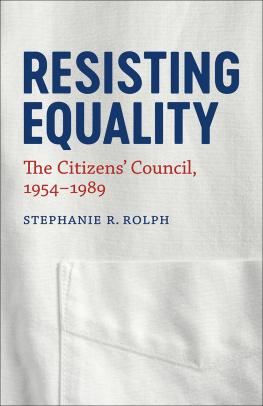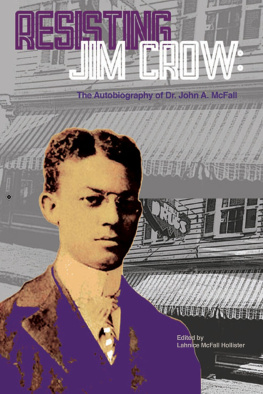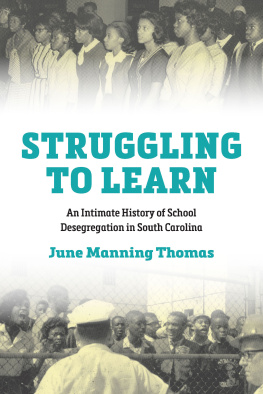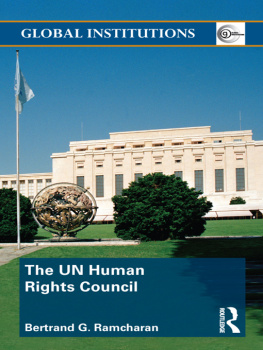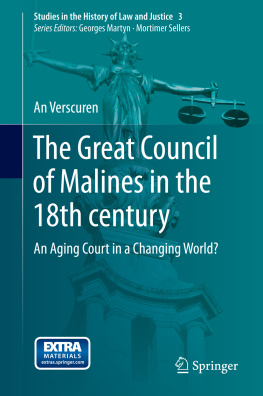Published by Louisiana State University Press
Copyright 2018 by Louisiana State University Press
All rights reserved
Manufactured in the United States of America
First printing
DESIGNER: Michelle A. Neustrom
TYPEFACES: Chaparral Pro, text; Cervo Neue, display
PRINTER AND BINDER: Sheridan Books, Inc.
LIBRARY OF CONGRESS CATALOGING-IN-PUBLICATION DATA
Names: Rolph, Stephanie Renee, author.
Title: Resisting equality : the Citizens Council, 19541989 / Stephanie R. Rolph.
Other titles: Making the modern South.
Description: Baton Rouge : Louisiana State University Press, [2018] | Series: Making the modern South | Includes bibliographical references and index.
Identifiers: LCCN 2017037460| ISBN 978-0-8071-6915-5 (cloth : alk. paper) | ISBN 978-0-8071-6916-2 (pdf) | ISBN 978-0-8071-6917-9 (epub)
Subjects: LCSH: Association of Citizens Councils of Mississippi. | Citizens Councils of America. | MississippiRace relations. | MississippiPolitics and government1951
Classification: LCC HS2330.C483 R65 2018 | DDC 323.1196/073076209045dc23
LC record available at https://lccn.loc.gov/2017037460
The paper in this book meets the guidelines for permanence and durability of the Committee on Production Guidelines for Book Longevity of the Council on Library Resources.

ACKNOWLEDGMENTS
I have often replied to questions about the timeline of this project with laments about the length of its gestation. Its development over the past several years has mirrored the follies and shortsightedness of a young scholar traveling from graduate school into her career. Along the way, I have been fortunate to have crossed paths with fellow scholars in a variety of fields who helped this project grow from a narrowly focused dissertation into a proper contribution.
Connie Lester saw the earliest and roughest versions of my assessment of the Citizens Council and nearly every iteration of it since. My gratitude to her as a mentor extends beyond her guidance to me as a senior scholar and encompasses my personal admiration for her strength, resilience, and generosity. Alan I. Marcus adopted me as his student in the last throes of my graduate school days when my fears of concluding the project and submitting versions of it for publication threatened to stall my completion indefinitely. He expected more than I ever thought was reasonable. He was right. Mark Goodman took me under his wing early and often and helped me cultivate my curiosities about conservative media venues like Forum.
The graduate program at Mississippi State University provided opportunities for research and support that directly impacted my collision with the Citizens Council. In particular, the Citizens Council Forum radio collection in the Mitchell Memorial Library Special Collections Department provided a lifeline of insight into the Councils ideology, its political alliances, and the longevity of its cause. The archivists there, Mattie Abraham and Betty Self, welcomed me every day for fifteen months and provided much needed distractions when transcribing became monotonous. I have special appreciation for Mattie, who patiently loaded and unloaded every reel for me, multiple times a day, for months. Without her commitment, Forum would not have been transcribed. Along similar lines, Leigh McWhite at the University of Mississippis Archives and Special Collections has consistently suggested productive leads and guided me through connections I would never have considered. Archivists and staff members at the Mississippi Department of Archives and History always met me with warmth and expertise. Anne Webster, Clinton Bagley, Julia Young, and Joyce Dixon-Lawson supported my searches and accommodated last-minute requests as the project went through final revisions.
Mississippi State brought me together with lifelong friends. Andra Knecht and Jeffrey Howell made for excellent office mates, colleagues, and friends. They provided laughs and reassurance when research stalled and job prospects seemed dim. Derek Cronin and Joel Barnes made Friday night poker games a worthwhile (and sometimes lucrative) distraction for me. As I transitioned out of the program, I was fortunate to meet Jason Ward, Anne Marshall, Jim Giesen, and Alison Greene as they began their careers at Mississippi State. They each embraced and encouraged my work and have remained valued friends as I have experienced my own transitions into early career. Their accomplishments have stood as models for my own aspirations.
The faculty and administration at Millsaps College have helped shepherd this project through additional research summers and the last-minute questions I had about the Citizens Council and its allies. In particular, my dean, Keith Dunn, has provided support and encouragement by reminding me that my value to Millsaps is rooted in my contributions as a scholar. Emlee Nicholson, Suzanne Marrs, Jeanne Middleton-Hairston, Marlys Vaughn, Louwanda Evans, Amy Forbes, and Bill Storey have each provided advice, encouragement, and entertainment when my balance seemed irretrievably lost. Madeline Iles and Anna Morgan Leonards have been apt pupils who have made their own contributions to the field, which demand recognition and provide hope that southern history is vibrant and necessary.
In the summer of 2010, as I prepared to begin my appointment at Millsaps, Martha Swain invited me to join a group that has shaped my identity as a scholar in ways that I cannot articulate fully. The Delta Women Writers required me to produce compelling scholarship, and their demands for quality work opened up opportunities that have been critical to my work. Our group has transitioned since my entry in 2010, but I have been grateful for nearly a decade of advice and mentorship from Emily Clark, Elizabeth Jacoway, Martha Swain, Elizabeth Payne, Beverly Bond, Anne Marshall, Cherisse Jones-Branch, Susan ODonovan, Deirdre Cooper Owens, Karen Leathem, Janet Allured, Gail Murray, Pam Tyler, Sarah Wilkerson-Freeman, Shennette Garrett-Scott, Sylvia Frey, Sheila Skemp, Rebecca Tuuri, and Story Matkin-Rawn.
I cannot say enough about Randal Hall and his encouragement to me as I made final revisions to my Journal of Southern History article. His gentle prodding and positive feedback helped me pull a particular portion of this project into a field that I was unfamiliar with, and my work with the JSH has raised a number of new opportunities for me to think about the transnational networks of white supremacy of which the Citizens Council was a member.
Years ago, David Goldfield initially identified my interest in the Council as worthwhile, before the dissertation had reached conclusion. It is hard to imagine this project without his wise suggestions for additional research and analysis. I am indebted to him for his close reading and his encouragement as we prepared the manuscript for final submission. Rand Dotson at LSU Press was patient and understanding as I familiarized myself with the process, and I am grateful to the expertise of this press for their insights into both detail and big-picture considerations.
The daily reality of this project cannot be adequately captured. Lots of people have provided an environment where I could grow into academe without making it my whole life. Pat Oden, Brian Clanton, and Kristen McCoy have humored me throughout the life of this book and have never doubted its publication. They have also reminded me that there are other things to talk about. Betty and Raymond Moore and Melissa and Michael Rolph have been generous in their support and their childcare, voicing just the right amount of questions about the projects status. Larry Oden will not be able to witness the completion of this very long project, but in a number of ways his support enabled it to happen. Campbell and Scarlett have grown up alongside this book. Their questions and excitement as it has neared completion have assured me. Marc Rolph knew me before he knew about the Citizens Council. I cannot imagine a better partner. He had no stake in this project other than my passion, but he endured the heaviest burden in its completionme.

